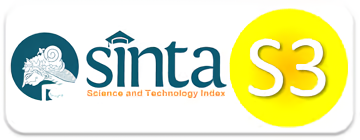Analysis of the Participation of Micro, Small, and Medium Enterprises (MSMEs) Taxpayers in Utilizing Tax Incentives Affected by the COVID-19 Pandemic
Downloads
This study aims to assess the effectiveness of the COVID-19 tax incentives that the government has issued. It focused on Micro, Small, and Medium Enterprises (MSMEs) taxpayers to participate in COVID-19 tax incentives. Using a qualitative method, this study used in-depth interviews with 2 informants who were a tax consultant and a small-medium enterprise accountant. The findings show that the effectiveness of the COVID-19 tax incentive is still lacking, and it is in line with the participation of MSMEs that is still low in utilizing tax incentives. The low participation of MSMEs in utilizing tax incentives can be seen from the data, which shows that after 5 months of running the program, out of around 2.3 million MSMEs, only 200,000 have taken advantage of this facility. The tax consultant states that the scheme that has been implemented in mitigating the financial burden of MSMEs is not effective for the object of incentives in not substantial. The informant suggests incentives to cover value-added tax also. The government is expected to create a new and better incentive scheme. The new incentive scheme is also to provide an equilibrium of responsibility for both government and society. This paper contributes theoretically by examining new types of tax incentives, namely COVID-19 tax incentives, and helping policymakers make better tax incentive schemes in the future.
Daude, C., Gutierrez, H., & Melguizo, A. (2017). Doctoring the ball: The political economy of tax incentives for investment in the Dominican Republic. Journal of Economic Studies, Vol. 44 No. 1, pp. 2-23. https://doi.org/10.1108/JES-05-2015-0090
Government Regulation of the Republic of Indonesia Number 23 of 2018 concerning Income Tax on Income from Business Received or Obtained by Taxpayers Who Have A Certain Gross Turnover.
Government Regulation of the Republic of Indonesia Number 46 of 2013 concerning Income Tax on Income from Businesses Received or Earned by Taxpayers Who Have Certain Circulation.
Jose, M., Sharma, R., & Dhanora, M. (2020). R&D tax incentive scheme and in-house R&D expenditure: evidences from Indian firms. Journal of Advances in Management Research, Vol. 17 No. 3, pp. 333-349. https://doi.org/10.1108/JAMR-05-2019-0080
Lin, H.-c., & Zeng, T. (2017). Information asymmetry and incentive contracting with the tax department. Review of Accounting and Finance, Vol. 16 No. 3, pp. 385-402. https://doi.org/10.1108/RAF-04-2016-0063
LPPI. (2015). Micro, Small and Medium Enterprises (MSMEs) Business Profiles. Jakarta. Cooperation between the Indonesian Banking Development Institute and Bank Indonesia.
Manly, T.S., Thomas, D.W., & Schulman, C.T. (2006). Tax Incentives for Economic Growth: Capital Investment or Research. Luttman, S. (Ed.). Advances in Taxation (Advances in Taxation, Vol. 17). Emerald Group Publishing Limited, Bingley, pp. 95-120. https://doi.org/10.1016/S1058-7497(06)17004-0
Morrow, M.L., & Rupert, T.J. (2015). The Effect of Federal-State Conformity on Taxpayer Decisions. Advances in Taxation (Advances in Taxation, Vol. 22). Emerald Group Publishing Limited, pp. 37-73. https://doi.org/10.1108/S1058-749720150000022001
OECD. (2000). A Sample Survey and Analysis of Corporate Tax Incentives for FDI. Prepared for the November 8-9, 2000 Conference on. OECD, South East Europe.
OECD. (2008). Tax incentives for investment: A global perspective experiences in MENA and Non-MENA countries. In Making reforms succeed: moving forward with the MENA investment policy agenda. OECD, Paris.
OECD. (2010). R&D Tax Incentives: Rationale, Design, Evaluation.
OECD. (2012). Perspectives on tax incentives for investment. In Task Force on Tax and Development Sub-group on State-building, Taxation and Aid. OECD.
OECD. (2018). Tax Incentives in Mining: Minimising Risks to Revenue. In Intergovernmental Forum on Mining, Minerals, Metals and Sustainable Development. OECD, Canada.
OECD. (2020). Tax and Fiscal Policy in Response to the Coronavirus Crisis: Strengthening Confidence and Resilience. OECD.
Regulation of the Minister of Finance of the Republic of Indonesia Number 23/PMK.03/2020 concerning Tax Incentives for Taxpayers Affected by the Corona Virus Outbreak.
Regulation of the Minister of Finance of the Republic of Indonesia Number 44/PMK.03/2020 concerning Tax Incentives for Taxpayers Affected by the 2019 Corona Virus Disease Pandemic.
Van Wyk, E. (2010). Tax incentives for biodiversity conservation in the Western Cape. Meditari Accountancy Research, Vol. 18 No. 1, pp. 58-75. https://doi.org/10.1108/10222529201000005
Copyright notice:
- Authors retain copyright and grant the journal right of first publication with the work simultaneously licensed under a Creative Commons Attribution-NonCommercial-ShareAlike 4.0 International License that allows others to share the work with an acknowledgement of the work's authorship and initial publication in this journal.
- Authors are able to enter into separate, additional contractual arrangements for the non-exclusive distribution of the journal's published version of the work with an acknowledgement of its initial publication in this journal.
- Authors are permitted and encouraged to post their work online (e.g., in institutional repositories or on their website) prior to and during the submission process, as it can lead to productive exchanges, as well as earlier and greater citation of published work (See The Effect of Open Access)
















